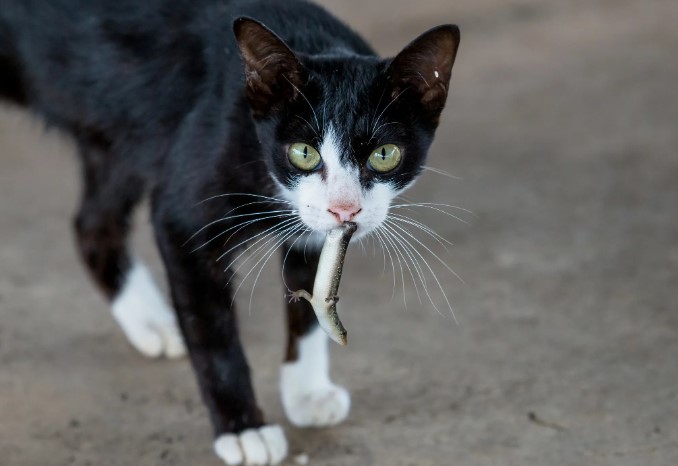Can cats eat lizards? What to do if cat eats lizard?
Cats are renowned for their keen hunting instincts, often engaging in the pursuit of various small animals, including birds, rodents, and even reptiles like lizards. If you’re a cat owner, you might wonder, “Can cats eat lizards?” Understanding the implications of your feline friend consuming lizards is crucial for ensuring their health and safety. This article delves into whether cats can eat lizards, the potential risks involved, and how to manage your cat’s natural hunting behaviors effectively. Follow Cat Memorial Stones !!
Understanding Cats’ Natural Diet and Hunting Behavior

Cats are obligate carnivores, meaning their diet requires nutrients found primarily in animal flesh. In the wild, cats naturally hunt and consume a variety of prey, including rodents, birds, and small reptiles like lizards. This hunting behavior is not only instinctual but also provides mental and physical stimulation essential for a cat’s well-being.
Why do cats eat lizards? Cats have an innate hunting instinct. Even well-fed domestic cats retain their ancestral behaviors, which include chasing small prey such as lizards, birds, and insects. For cats, hunting is more about satisfying this natural drive than hunger. Lizards move quickly, making them appealing targets for a cat’s hunting reflexes.
Types of Lizards Commonly Encountered by Household Cats
Domestic cats may encounter various types of lizards, especially in regions where these reptiles are prevalent. Common lizards that cats might prey on include:
- Geckos: Small, nocturnal lizards often found in warm climates.
- Anoles: Also known as grass or green anoles, these lizards are common in gardens and yards.
- Skinks: Sleek, smooth-bodied lizards that can be found in diverse habitats.
- Iguanas: Larger lizards, though less commonly hunted by cats due to their size.
Can cats eat lizards? Can a cat die from eating a lizard?

While it’s not uncommon for cats to eat lizards, not all lizards are safe. In some cases, eating lizards can cause serious health issues for your feline friend.
Potential Risks of Eating Lizards:
- Toxins: Some lizards, particularly in certain regions, can be poisonous to cats. For example, the Gila monster and Mexican beaded lizard are venomous species that can cause severe harm to cats.
- Parasites: Lizards can carry parasites such as liver flukes or intestinal worms, which can be transmitted to cats upon ingestion. Liver flukes, in particular, can cause significant damage to a cat’s liver and bile ducts, leading to lethargy, jaundice, and even death if untreated.
- Salmonella: Lizards, like other reptiles, can carry salmonella bacteria. If a cat ingests an infected lizard, it may contract a serious gastrointestinal illness.
>>> Click Can cats eat mosquitoes?
Signs Your Cat May Be Sick After Eating a Lizard
If your cat has eaten a lizard, it’s essential to monitor for any signs of illness. Some common symptoms that indicate your cat may have contracted a disease or ingested something harmful include:
- Vomiting
- Diarrhea
- Lethargy
- Loss of appetite
- Jaundice (yellowing of the skin or eyes)
- Excessive drooling or mouth irritation
If your cat exhibits any of these symptoms, it’s crucial to consult a veterinarian immediately. Early treatment can prevent more serious complications.
What to do if cat eats lizard?
If you suspect your cat has eaten a lizard, here are some steps to follow:
- Observe Your Cat: Keep a close eye on your cat for the next 24–48 hours for any signs of illness or unusual behavior. Most healthy cats can tolerate eating a small lizard without issue, but it’s better to be cautious.
- Contact Your Veterinarian: If your cat shows signs of distress or sickness, contact your vet as soon as possible. Be sure to inform them if the lizard was a potentially dangerous species.
- Regular Vet Check-ups: If your cat frequently catches and eats lizards, it’s a good idea to have your vet check for parasites during routine visits. Preventative care can help catch any issues before they become serious.
Can Cats Digest Lizards?
Cats are obligate carnivores, meaning their digestive systems are well-equipped to handle meat. While cats can digest most parts of a lizard, including its muscles and bones, some parts, such as the lizard’s tail or skin, might cause digestive discomfort. These undigestible parts could lead to vomiting or blockages if consumed in large quantities.

How to stop cat from eating lizards?
If your cat regularly ventures outdoors or you live in an area where lizards are abundant, preventing your cat from hunting them might be challenging. However, you can reduce the likelihood of your cat eating lizards with a few measures:
- Supervised Outdoor Time: If your cat enjoys outdoor exploration, consider supervising their outdoor time to prevent hunting.
- Indoor Enrichment: Provide plenty of stimulating toys and activities indoors to satisfy your cat’s hunting instincts. Puzzle feeders, interactive toys, and regular playtime can help keep them occupied.
- Lizard-Proofing: If possible, minimize the lizard population around your home by sealing cracks in walls or window screens where they might enter. Removing sources of food and water outside may also reduce their presence.
Can Lizards Harm Cats?
Most small lizards, like geckos and skinks, are generally harmless to cats, provided they are non-toxic and do not carry any parasites or bacteria. However, larger or venomous lizard species can pose a threat. Additionally, even non-poisonous lizards can defend themselves by biting, potentially injuring your cat.
Conclusion
While most cats can safely eat small lizards without serious harm, the risks associated with parasites, toxins, and bacteria should not be ignored. It’s essential to monitor your cat’s health closely after eating a lizard and consult a veterinarian if there are any signs of illness. Preventative measures such as regular vet check-ups and supervised outdoor time can also help protect your feline friend from potential harm.
FAQs
- Do stray cats eat lizards?
Yes, stray cats do eat lizards. Their natural hunting instincts often lead them to pursue and consume smaller prey, including reptiles like lizards. This behavior is particularly common in areas where lizards are abundant and cats have limited access to other food sources.
- Can persian cats eat lizards?
Yes, Persian cats can eat lizards. Their natural instincts as carnivores often lead them to hunt and consume smaller prey like lizards.
However, while most lizards are harmless to cats, there are a few potential risks:
-
- Parasites: Some lizards can carry parasites that can infect cats.
- Toxicity: A few species of lizards are poisonous and can cause harm if ingested.
- Digestive issues: Eating whole animals, including lizards, can sometimes lead to digestive upset in cats.
- Can domestic cats eat lizards? Yes, domestic cats can eat lizards. Their natural hunting instincts often lead them to pursue and consume small prey like lizards.
>>> Read: Can cats eat cockroaches?
